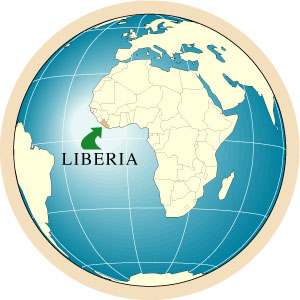
It is little wonder that Liberians suffer from ill health. The country’s hot, rain-soaked climate provides a feasting frenzy for dozens of dreadful diseases: cholera, lymphatic filariasis, yellow fever, and river blindness, to name a few. Above all, just one disease --- malaria --- poses the single greatest health threat. Spread by the bite of an infected mosquito, malaria is so pervasive in Liberia that it is deemed hyperendemic. The disease kills a staggering number of children – one of every two children that dies before the age of five is killed by malaria -- and is one of the primary reasons that Liberia has the fourth highest rates of child mortality in all of Africa.
Yet in the face of these pernicious diseases, the government’s capacity to fund life-saving medicines, clinics, and health programs is woefully inadequate. Liberia has only recently emerged from two decades of civil war, which left the government saddled with more than $3 billion in foreign debt and constrained by a shattered revenue base. Last year, the entire budget of the Government of Liberia was just $129 million and was divided among many additional pressing priorities. Thus while the health needs of the country are mammoth, they dwarf the government’s ability to finance them. Today the Government of Liberia spends less than $5 per person per year for health, a teeny fraction of the average $5,627 per person that the United States spends annually, and hardly enough to keep its citizens healthy.
Worrisome still is the shortage of trained health care workers in Liberia. For a country of more than three million people, there are fewer than 40 Liberian doctors and 50 nurse midwives. To put this into perspective, the building on M Street in Washington, DC that houses my primary care physician has more doctors sitting together under one roof than there are Liberian doctors in the entire country of Liberia. Moreover, years of destruction and looting during the war severely damaged the health infrastructure throughout the country.
Perhaps most damning is the reality that Liberia does not yet have the tools in its arsenal to win the battle against infectious diseases. Without a vaccine to prevent malaria, treatment efforts have been undermined by the increasing resistance of mosquitoes to antimalarial drugs, and prevention efforts with treated bednets have made only modest strides. Yet success is possible. In spite of all of the deficiencies in Liberia’s broken health system, one of the most stunning accomplishments has been the immunization of more than 95% of Liberian children with the measles vaccine and the subsequent slashing of measles deaths. Imagine the sheer number of lives that could be saved if Liberia had a malaria vaccine!
Today the world – and Liberia – still waits for a malaria vaccine to be developed. Unfortunately, the shallow pockets of Liberia’s citizens alone will not induce the private sector to step up to the plate. Three quarters of Liberia’s citizens live on less than a dollar a day and few if any have access to health insurance. This poverty makes Liberians – and their neighbors in Africa, a continent which accounts for 90% of malaria deaths worldwide -- unlikely customers for expensive new health technologies, and provides little financial incentive for costly investments by pharmaceutical companies in the discovery and development of life-saving vaccines. Too often, diseases like malaria are then sidelined from the global research agenda.
Thankfully, there exists a promising new solution to this colossal market failure. This year marked the launch of the first ever "
Advance Market Commitment," an innovative financing mechanism that creates commercial incentives for pharmaceutical companies to invest in the development of life-saving medicines that they may otherwise ignore. To do this, the Advance Market Commitment enables international donors to make a binding commitment to finance a specific vaccine (such as a malaria vaccine) if and when it is developed, at a price that is profitable. The brilliance of this scheme is that it allows donors to unleash the powerful ingenuity and innovation of the private sector, aligning technological advances with the greatest social good. In February donors committed $1.5 billion to such a mechanism to spur the development of a vaccine to prevent child pneumonia. Should donors decide to act, a similar mechanism for malaria may not be far behind.
A sobering year of grad school has already drained from me any illusions of holy grails or “silver bullet” solutions for ending poverty. To be sure, a malaria vaccine is not a panacea -- it cannot fix the gaping weaknesses in Liberia’s health system, nor perform miracles with Liberia’s budget – but it sure comes close. Saving the lives of half of Liberia's children who die before they reach their fifth birthday with just one powerful shot? Sounds pretty miraculous to me.













